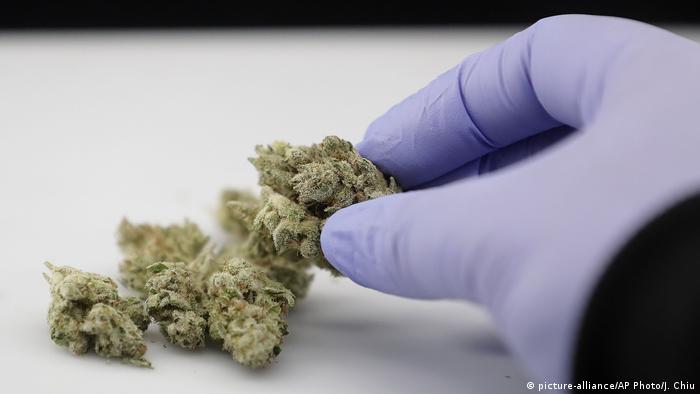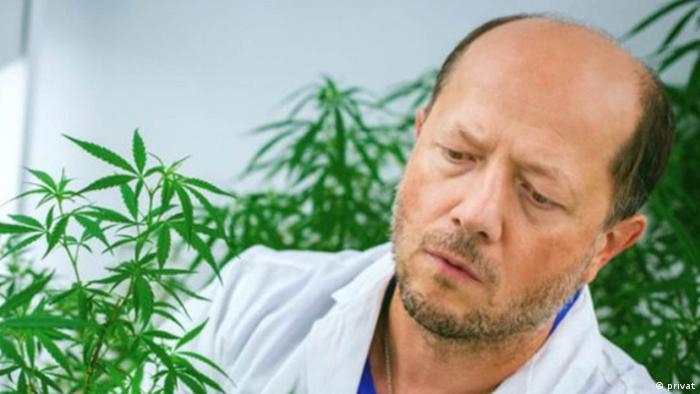Cannabis shows promise blocking coronavirus infection: Alberta researcher
Bill Kaufmann POSTMEDIA 5/7/2020

University of Lethbridge researcher Igor Kovalchuk is leading a study on medical cannabis as a potential therapy for COVID-19. SUBMITED PHOTO
Cannabis extracts are showing potential in making people more resistant to the novel coronavirus, says an Alberta researcher leading a study.
After sifting through 400 cannabis strains, researchers at the University of Lethbridge are concentrating on about a dozen that show promising results in ensuring less fertile ground for the potentially lethal virus to take root, said biological scientist Dr. Igor Kovalchuk.
“A number of them have reduced the number of these (virus) receptors by 73 per cent, the chance of it getting in is much lower,” said Kovalchuk.
“If they can reduce the number of receptors, there’s much less chance of getting infected.”
Employing cannabis sativa strains over the past three months, the researcher said the effective balance between cannabis components THC and CBD — the latter more typically associated with medical use — is still unclear in blocking the novel coronavirus.
This advertisement has not loaded yet, but your article continues below.
“It will take a long time to find what the active ingredient is — there may be many,” said Kovalchuk, whose Pathway RX is owned partly by Olds-based licensed cannabis producer Sundial Growers and partnered with Alberta cannabis researcher Swysh.
But it’s generally the anti-inflammatory properties of high-CBD content that have shown most promise, he added.
“We focus more on the higher CBD because people can take higher doses and not be impaired,” said Kovalchuk.
The study under Health Canada licence using artificial human 3-D tissue models has been seeking ways to hinder the highly contagious novel coronavirus from finding a host in the lungs, intestines, and oral cavity.
If successful, the work could find practical medical use in the form of mouth wash, gargle, inhalants or gel caps, said Kovalchuk.
“It would be cheaper for people and have a lot less side-effects,” he said.
But the absence of clinical trials remains a barrier, and funding from an increasingly cash-strapped cannabis industry isn’t there to fuel that, said Kovalchuk.
“We have clinicians who are willing to work with us but for a lot of companies in the cannabis business, it’s significant cash that they can’t afford,” he said.
The scientist emphasized the findings wouldn’t lead to a vaccine — something “less specific and precise” but nonetheless another possible weapon against COVID-19.
After sifting through 400 cannabis strains, researchers at the University of Lethbridge are concentrating on about a dozen that show promising results in ensuring less fertile ground for the potentially lethal virus to take root, said biological scientist Dr. Igor Kovalchuk.
“A number of them have reduced the number of these (virus) receptors by 73 per cent, the chance of it getting in is much lower,” said Kovalchuk.
“If they can reduce the number of receptors, there’s much less chance of getting infected.”
Employing cannabis sativa strains over the past three months, the researcher said the effective balance between cannabis components THC and CBD — the latter more typically associated with medical use — is still unclear in blocking the novel coronavirus.
This advertisement has not loaded yet, but your article continues below.
“It will take a long time to find what the active ingredient is — there may be many,” said Kovalchuk, whose Pathway RX is owned partly by Olds-based licensed cannabis producer Sundial Growers and partnered with Alberta cannabis researcher Swysh.
But it’s generally the anti-inflammatory properties of high-CBD content that have shown most promise, he added.
“We focus more on the higher CBD because people can take higher doses and not be impaired,” said Kovalchuk.
The study under Health Canada licence using artificial human 3-D tissue models has been seeking ways to hinder the highly contagious novel coronavirus from finding a host in the lungs, intestines, and oral cavity.
If successful, the work could find practical medical use in the form of mouth wash, gargle, inhalants or gel caps, said Kovalchuk.
“It would be cheaper for people and have a lot less side-effects,” he said.
But the absence of clinical trials remains a barrier, and funding from an increasingly cash-strapped cannabis industry isn’t there to fuel that, said Kovalchuk.
“We have clinicians who are willing to work with us but for a lot of companies in the cannabis business, it’s significant cash that they can’t afford,” he said.
The scientist emphasized the findings wouldn’t lead to a vaccine — something “less specific and precise” but nonetheless another possible weapon against COVID-19.
“The extracts of our most successful and novel high CBD C sativa lines, pending further investigation, may become a useful and safe addition to the treatment of COVID-19 as an adjunct therapy,” said Kovalchuk.
“Given the current dire and rapidly evolving epidemiological situation, every possible therapeutic opportunity and avenue must be considered.”
Israeli researchers have begun clinical trials of CBD as a treatment to repair cells damaged by COVID-19 by using its anti-inflammatory abilities.
It’s thought CBD could enhance the traditional effect of steroids in such treatment of patients in life-threatening condition and also bolster the immune system.
It’s the kind of research and his own that deserves government support in Canada, whose federal government has pledged $1.1 billion in funding for COVID-19 research said the U of L scientist.
“Our work could have a huge influence — there aren’t many drugs that have the potential of reducing infection by 70 to 80 per cent,” he said.
Coronavirus: The tide is coming for medicinal cannabis
Cannabis researchers in Canada say the plant-based drug may provide resistance to SARS-CoV-2. Their preliminary findings are part of broader research into the use of medicinal cannabis in treating cancer.

The search for a vaccine for the new coronavirus, SARS-CoV-2, or indeed a medicinal drug to cure it, has taken researchers down both traditional and less traditional avenues.
They have looked at existing drug candidates, such as remdesivir, which was original developed to treat Ebola. In Germany, the first clinical trials for a coronavirus vaccine are based on a candidate developed for cancer immunology.
There's a study out of France that suggests nicotine — typically ingested via the often-lethal pastime of smoking — may protect people against the novel coronavirus, itself a potentially fatal lung infection.
And, now, preliminary research is emerging out of Canada that certain strains of the psychoactive drug cannabis may also increase resistance to the coronavirus. If the study, which is not yet peer reviewed, can be verified, it would appear that cannabis works in a similar way to nicotine.
"The results on COVID-19 came from our studies on arthritis, Crohn's disease, cancer and others," says Dr. Igor Kovalchuck, a professor of Biological Sciences at the University of Lethbridge, in an email to DW.
Read more: Cannabis in Thailand: How far will the green gold rush go?
Thailand opens first clinics offering free cannabis
Blocking gateways
As with the research into nicotine's effect on the coronavirus, it is thought that some strains of cannabis reduce the virus' ability to enter the lungs, where it takes hold, reproduces and spreads.
In a paper on preprints.org, where scientists can publish non-peer-reviewed results, Kovalchuck and colleagues write that their specially developed strains of cannabis effectively stop the virus from entering the human body.
The study is one of many papers globally that have been shared on preprint websites, including preprints.org, in a bid to disseminate preliminary findings into potential COVID-19 treatments that have yet to undergo rigorous peer review.
The coronavirus needs a "receptor" to enter a human host. That receptor is known as an "angiotensin-converting enzyme II," or ACE2.
ACE2 is found in lung tissue, in oral and nasal mucus, in the kidneys, testes, and gastrointestinal tracts, they write.
And the theory is that by modulating ACE2 levels in those "gateways" to the human host, it may be possible to lower our susceptibility, or vulnerability, to the virus. It could basically reduce our risk of infection.
"If there's no ACE2 on tissues, the virus will not enter," says Kovalchuck.

Dr. Igor Kovalchuk, cannabis researcher at the University of Lethbridge, Alberta, and co-founder of Inplanta BiotechnologyNo common or garden cannabis
Some in the science community say medicinal cannabis may help to treat a range of conditions from nausea to dementia. But medicinal cannabis is not the same as what you might call recreational cannabis.
Those more "common or garden varieties" of cannabis — or street cannabis — are known for their Tetrahydrocannabinol (THC) content. That's the main psychoactive agent in the drug.
The Alberta-based researchers, meanwhile, have focused on strains of the plant, Cannabis sativa, that are high in an anti-inflammatory cannabinoid, cannabidiol (CBD) — one of the other main chemicals in cannabis, aside from THC.
They have developed over 800 new Cannabis sativa variants, with high levels of CBD, and identified 13 extracts which they say modulate ACE2 levels in those humans gateways.
"Our varieties are high in CBD, or balanced CBD/THC, because you can give a higher dose and people will not be impaired due to the psychoactive properties of THC," says Kovalchuck.
Read more: Angela Merkel's party mulls legalizing cannabis in Germany
Inside Europe: The benefits and challenges of medical cannabis
Low funding, low knowledge
Kovalchuck also heads a company called Inplanta BioTechnology, with Dr. Darryl Hudson, who has a PHD from the University of Guelph — another Canadian institute where research is ongoing into the use of cannabinoids in medicine.
But funding for cannabinoid research is "still hard," he says. And that's the case in other countries, too.
Some researchers in the UK say that may be because there are misconceptions among the general public and politicians about medicinal cannabis, perhaps even a fear that people will become addicted or try to self-medicate, using just any old form of cannabis they can find.
Those researchers say themselves that it is vital to be clear about the information and to avoid sensationalism.
"Researchers have to be particularly careful when disseminating their results given the socio-political volatility of medicinal cannabis use," says Chris Albertyn, a Research Portfolio Lead at King's College London, and an expert on cannabinoids and dementia.
The best way to get through that, says Albertyn, is to implement open, transparent research methods.
"In this instance, the current research from Canada has just unveiled a potential therapeutic 'mechanism of action' but that would need to be validated and tested in well-designed, robust clinical trials before any meaningful clinical conclusions can be drawn," he says.
That would include pre-registering clinical protocols and analysis methods, publishing in open access journals, double-blind placebo controlled trials, and strict, independent peer review by the clinical academic community, says Albertyn.
A turning tide
The problem is that without sufficient funding and further research, there is too little knowledge about cannabinoids — whether it's positive or negative research results — some say we just won't know until we do the research.
"But there is ENORMOUS interest now," said Kovalchuk in his email. And that's his emphasis. "The tide is coming."
While he and his co-authors say even their most effective extracts require large-scale validation, they say they may be a "safe addition" to the treatment of COVID-19. An addition, mind, alongside other treatments.
So, large-scale verification pending, medicinal cannabis could be developed into "easy-to-use preventative treatments," such as a mouthwash or a throat gargle in both clinical and home use.
No comments:
Post a Comment